简。奥斯丁 英文版
- 格式:doc
- 大小:53.00 KB
- 文档页数:8
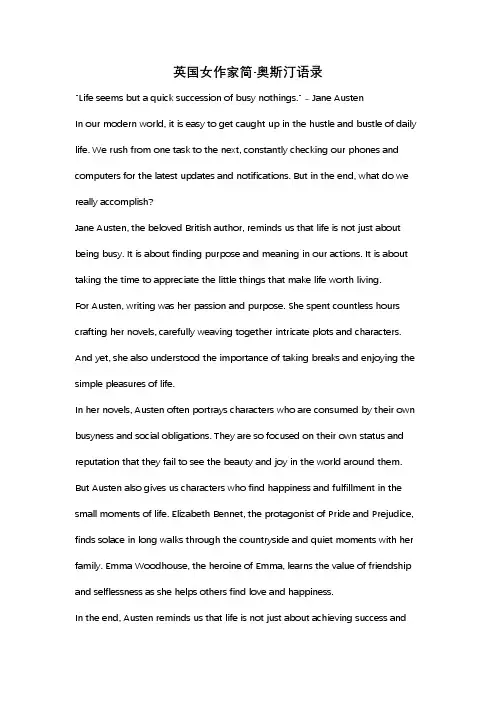
英国女作家简·奥斯汀语录"Life seems but a quick succession of busy nothings." - Jane AustenIn our modern world, it is easy to get caught up in the hustle and bustle of daily life. We rush from one task to the next, constantly checking our phones and computers for the latest updates and notifications. But in the end, what do we really accomplish?Jane Austen, the beloved British author, reminds us that life is not just about being busy. It is about finding purpose and meaning in our actions. It is about taking the time to appreciate the little things that make life worth living.For Austen, writing was her passion and purpose. She spent countless hours crafting her novels, carefully weaving together intricate plots and characters. And yet, she also understood the importance of taking breaks and enjoying the simple pleasures of life.In her novels, Austen often portrays characters who are consumed by their own busyness and social obligations. They are so focused on their own status and reputation that they fail to see the beauty and joy in the world around them. But Austen also gives us characters who find happiness and fulfillment in the small moments of life. Elizabeth Bennet, the protagonist of Pride and Prejudice, finds solace in long walks through the countryside and quiet moments with her family. Emma Woodhouse, the heroine of Emma, learns the value of friendship and selflessness as she helps others find love and happiness.In the end, Austen reminds us that life is not just about achieving success andstatus. It is about finding joy and purpose in the everyday moments that make up our lives. So let us take a cue from Austen and slow down, appreciate the beauty around us, and find meaning in the busy nothings of life.。
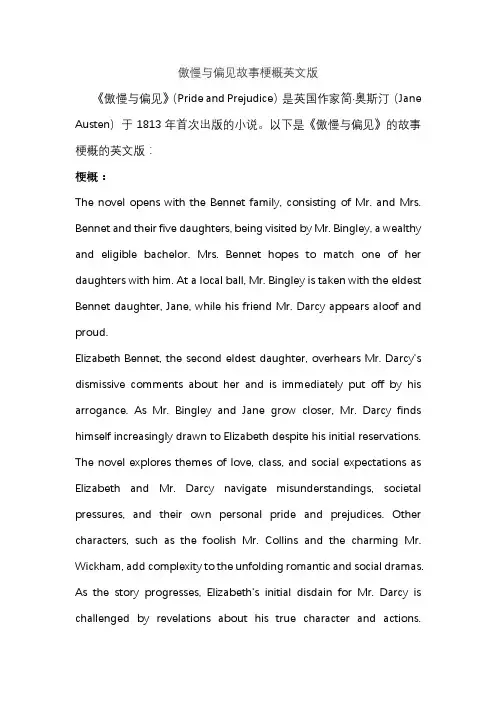
傲慢与偏见故事梗概英文版《傲慢与偏见》(Pride and Prejudice)是英国作家简·奥斯汀(Jane Austen)于1813年首次出版的小说。
以下是《傲慢与偏见》的故事梗概的英文版:梗概:The novel opens with the Bennet family, consisting of Mr. and Mrs. Bennet and their five daughters, being visited by Mr. Bingley, a wealthy and eligible bachelor. Mrs. Bennet hopes to match one of her daughters with him. At a local ball, Mr. Bingley is taken with the eldest Bennet daughter, Jane, while his friend Mr. Darcy appears aloof and proud.Elizabeth Bennet, the second eldest daughter, overhears Mr. Darcy's dismissive comments about her and is immediately put off by his arrogance. As Mr. Bingley and Jane grow closer, Mr. Darcy finds himself increasingly drawn to Elizabeth despite his initial reservations. The novel explores themes of love, class, and social expectations as Elizabeth and Mr. Darcy navigate misunderstandings, societal pressures, and their own personal pride and prejudices. Other characters, such as the foolish Mr. Collins and the charming Mr. Wickham, add complexity to the unfolding romantic and social dramas. As the story progresses, Elizabeth's initial disdain for Mr. Darcy is challenged by revelations about his true character and actions.Similarly, Mr. Darcy must confront his own pride and rethink his attitudes towards those he considers beneath him.In the end, after various twists and turns, misunderstandings are cleared, and Elizabeth and Mr. Darcy come to understand and appreciate each other. Their eventual union is a triumph over the societal norms and prejudices that initially kept them apart.Note: This is a brief summary of the novel, and the richness of the characters and social commentary in "Pride and Prejudice" is best appreciated by reading the full text.。


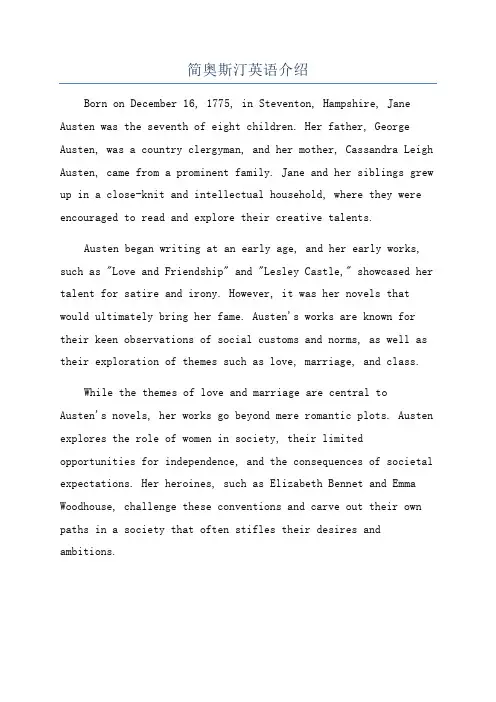
简奥斯汀英语介绍Born on December 16, 1775, in Steventon, Hampshire, Jane Austen was the seventh of eight children. Her father, George Austen, was a country clergyman, and her mother, Cassandra Leigh Austen, came from a prominent family. Jane and her siblings grew up in a close-knit and intellectual household, where they were encouraged to read and explore their creative talents.Austen began writing at an early age, and her early works, such as "Love and Friendship" and "Lesley Castle," showcased her talent for satire and irony. However, it was her novels that would ultimately bring her fame. Austen's works are known for their keen observations of social customs and norms, as well as their exploration of themes such as love, marriage, and class.While the themes of love and marriage are central toAusten's novels, her works go beyond mere romantic plots. Austen explores the role of women in society, their limited opportunities for independence, and the consequences of societal expectations. Her heroines, such as Elizabeth Bennet and Emma Woodhouse, challenge these conventions and carve out their own paths in a society that often stifles their desires and ambitions.。
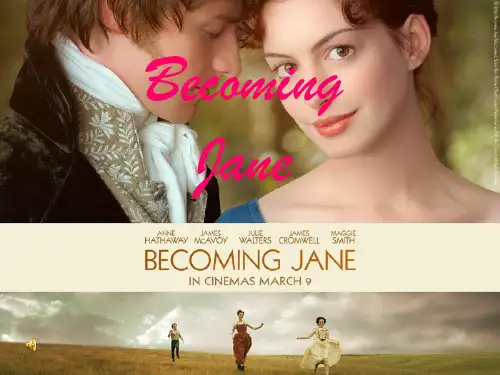
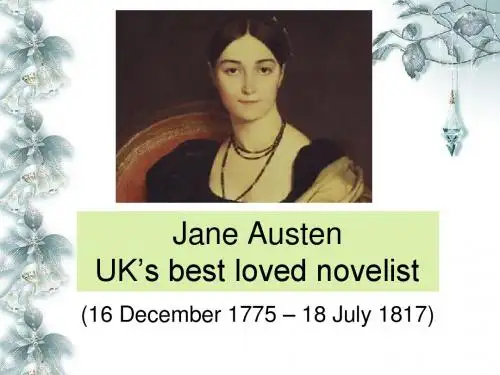
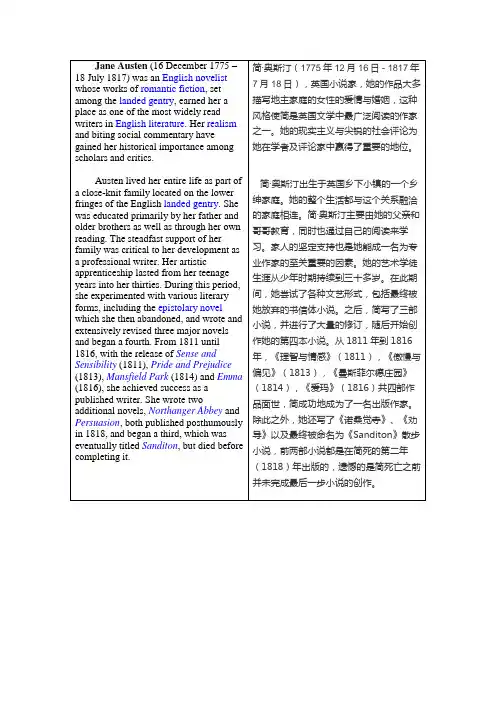
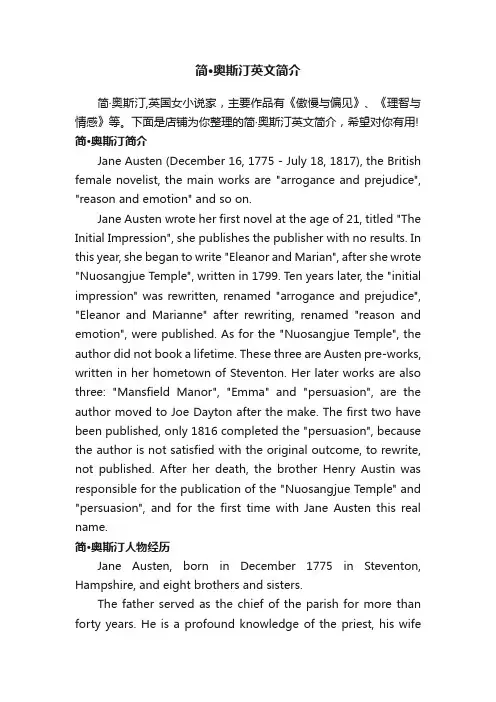
简·奥斯汀英文简介简·奥斯汀,英国女小说家,主要作品有《傲慢与偏见》、《理智与情感》等。
下面是店铺为你整理的简·奥斯汀英文简介,希望对你有用! 简·奥斯汀简介Jane Austen (December 16, 1775 - July 18, 1817), the British female novelist, the main works are "arrogance and prejudice", "reason and emotion" and so on.Jane Austen wrote her first novel at the age of 21, titled "The Initial Impression", she publishes the publisher with no results. In this year, she began to write "Eleanor and Marian", after she wrote "Nuosangjue Temple", written in 1799. Ten years later, the "initial impression" was rewritten, renamed "arrogance and prejudice", "Eleanor and Marianne" after rewriting, renamed "reason and emotion", were published. As for the "Nuosangjue Temple", the author did not book a lifetime. These three are Austen pre-works, written in her hometown of Steventon. Her later works are also three: "Mansfield Manor", "Emma" and "persuasion", are the author moved to Joe Dayton after the make. The first two have been published, only 1816 completed the "persuasion", because the author is not satisfied with the original outcome, to rewrite, not published. After her death, the brother Henry Austin was responsible for the publication of the "Nuosangjue Temple" and "persuasion", and for the first time with Jane Austen this real name.简·奥斯汀人物经历Jane Austen, born in December 1775 in Steventon, Hampshire, and eight brothers and sisters.The father served as the chief of the parish for more than forty years. He is a profound knowledge of the priest, his wifewas born in the more wealthy family, but also has a certain cultural accomplishment. Therefore, although Austin did not enter the formal school, but the family's excellent conditions and reading environment, gave her self-learning conditions, cultivate her writing interest. She began to write something at the age of thirteen, showing her talent in language. In 1800 the father retired, the family moved to Bath, Austin does not like this place, she was said to have suffered torture torture. Here, Austin rejected a young man who would inherit the great fortune, because she did not love him. Lived for four years or so, his father died in the place, so Austin and mother, sister and moved to Southampton, 1809 and then moved to Jordon. In early 1816 she was seriously ill, the body is weakening, in May 1817 was sent to Winchester for treatment, but the treatment is invalid, in the same year on July 18 died in her sister's arms. She was unmarried for the rest of her life and was buried in Winchester Cathedral. 简·奥斯汀创作特点Theme of the workAustin's characters are fictional, but they all reflect Austen's own view of marriage. The changes in the era of Austin life, social, economic and political changes have affected the various classes. At that time, the rural aristocracy and the landlord youth also reflected some ideas on human nature and humanity after the rise of the Renaissance. For example, "arrogance and prejudice" in the Elizabeth fully embodies Austen's longing for the love and marriage model, Elizabeth and Darcy in the exchanges, advocating the principle of equality between men and women, abandon the traditional male superiority view, and that noble feelings are people's normal need. At the same time, Austin's ideal marriage in addition to equality, respect, there is freedomand understanding, she hopes to help people get rid of the shackles of traditional thinking, to find themselves, to achieve self.Artistic characteristicsAusten's style of work is so witty, full of comedy. Because Austin life for the rest of his life in the feudal forces of the powerful village, coupled with well-off family, so the circle of life is very small. Which makes her works are often confined to the ordinary gentry daughter love the story of marriage, and her works to some extent reflect the feudal forces point of view. The work mainly through the ladies gentlemen's social communication, daily dialogue to reflect the family and social moral standards. Which makes Austen's work for a long time considered to be popular books. However, although Austen's work is likened to "two-inch ivory carvings", but she still through the gentleman's daily conversation and communication to reflect the social attitudes at that time, with humorous language to irony mercenary, love vanity phenomenon , Through the comic scenes ridicule people stupid, selfish, snobbish and blind self-confidence and other ridiculous weaknesses.。
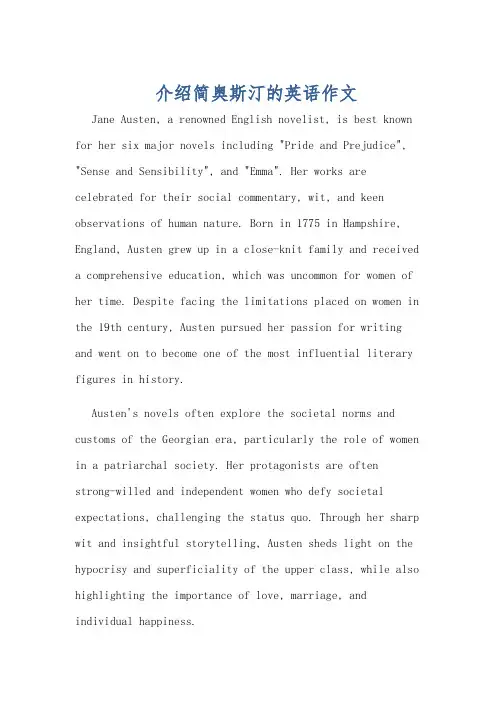
介绍简奥斯汀的英语作文Jane Austen, a renowned English novelist, is best known for her six major novels including "Pride and Prejudice", "Sense and Sensibility", and "Emma". Her works are celebrated for their social commentary, wit, and keen observations of human nature. Born in 1775 in Hampshire, England, Austen grew up in a close-knit family and received a comprehensive education, which was uncommon for women of her time. Despite facing the limitations placed on women in the 19th century, Austen pursued her passion for writing and went on to become one of the most influential literary figures in history.Austen's novels often explore the societal norms and customs of the Georgian era, particularly the role of women in a patriarchal society. Her protagonists are oftenstrong-willed and independent women who defy societal expectations, challenging the status quo. Through her sharp wit and insightful storytelling, Austen sheds light on the hypocrisy and superficiality of the upper class, while also highlighting the importance of love, marriage, and individual happiness.One of Austen's most beloved works, "Pride and Prejudice", is a timeless classic that continues to captivate readers around the world. The novel follows the tumultuous relationship between Elizabeth Bennet and Mr. Darcy, and is celebrated for its sharp social commentary, memorable characters, and enduring romance. Austen's keen understanding of human nature and her ability to craft compelling narratives have solidified her reputation as a literary genius.In addition to her literary achievements, Austen's personal life and experiences have also contributed to her enduring legacy. Though she never married, her letters and personal writings reveal a keen sense of humor and a deep understanding of human emotions. Her portrayal of love and relationships in her novels is often seen as a reflection of her own views and experiences, adding depth and authenticity to her work.In conclusion, Jane Austen's impact on literature and popular culture is immeasurable. Her timeless novels continue to inspire and entertain readers of all ages, and her legacy as a pioneering female author lives on. Throughher insightful social commentary and memorable characters, Austen's work remains as relevant and beloved today as it was during her lifetime.简·奥斯汀,一位著名的英国小说家,以她的六部主要小说《傲慢与偏见》、《理智与情感》和《艾玛》而闻名。
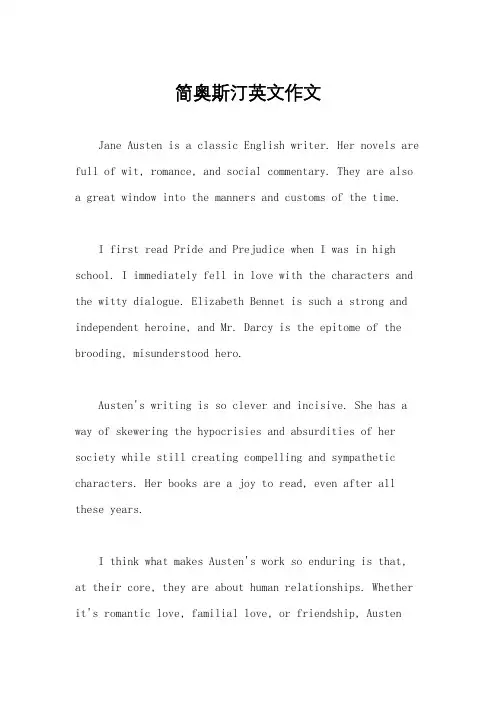
简奥斯汀英文作文Jane Austen is a classic English writer. Her novels are full of wit, romance, and social commentary. They are also a great window into the manners and customs of the time.I first read Pride and Prejudice when I was in high school. I immediately fell in love with the characters and the witty dialogue. Elizabeth Bennet is such a strong and independent heroine, and Mr. Darcy is the epitome of the brooding, misunderstood hero.Austen's writing is so clever and incisive. She has a way of skewering the hypocrisies and absurdities of her society while still creating compelling and sympathetic characters. Her books are a joy to read, even after all these years.I think what makes Austen's work so enduring is that, at their core, they are about human relationships. Whether it's romantic love, familial love, or friendship, Austenunderstands the complexities and nuances of human connection.I also appreciate Austen's focus on the lives of women. In a time when women's voices were often silenced, Austen gave her female characters agency and depth. She showedthat women's stories are just as worthy of being told as men's.Austen's influence can still be felt today. Her novels have been adapted into countless movies and TV shows, and her characters and themes continue to resonate with readers of all ages. She may have lived in a different time, but her insights into human nature are timeless.。
简奥斯汀的英文作文英文:Jane Austen is one of my favorite authors. I love the way she writes about society and relationships in her novels. Her use of wit and humor always makes me laugh and her characters are so relatable. I think her writing style is timeless and her stories are still relevant today.One of my favorite novels by Jane Austen is Pride and Prejudice. I love the relationship between Elizabeth Bennet and Mr. Darcy. Their initial dislike for each other and eventual love story is so captivating. I also enjoy the way Austen portrays the society of the time, with its strict social rules and expectations.Another novel I enjoy is Sense and Sensibility. The contrast between the two sisters, Elinor and Marianne, is so interesting. Elinor is practical and reserved while Marianne is emotional and impulsive. Their differentapproaches to life and love make for a great story.Overall, I think Jane Austen's novels are a great reflection of society and relationships during her time period. Her writing style and characters are still relevant today and her stories are timeless.中文:简·奥斯汀是我最喜欢的作家之一。
傲慢与偏见英文精读《傲慢与偏见》(Pride and Prejudice)是英国女小说家简·奥斯汀(Jane Austen)的代表作,讲述了乡绅班纳特一家嫁女儿的故事,小说的主线为女主角伊丽莎白与达西的情感纠葛。
以下是小说中的一段英文精读:"You are severe on him," said Elizabeth."I rather think I am; I have known him long enough to do so; and yet I think him a very fine fellow.""But you are not in love with him, I hope," said her sister. "La! You make me laugh. What a question.""I am not so sure of that," replied Jane; "but I believe it is not very likely. At present I neither know nor care about it."This was spoken in a tone of indifference, but Elizabeth could easily perceive that her sister had an inclination; and the same suspicion darted into her own mind respecting Mr. Bingley. She thought of his eyes, his smile, his air, and was overcome by the belief of hisattection. It was too soon, however, to determine with certainty; and she said nothing."If I were sure that he loved me," added Jane, after a short silence, "I should be the happiest creature in the world; but I dare not expect such a thing.""I dare not say I am certain of it," replied Elizabeth, "but I am persuaded that he has a very sincere regard for you.""We are quite agreed then," said Jane, smiling at her sister. "To be sure, our situations are very different. But the more I see of him, the more I am convinced that there is no impropriety in my being in love with him.""If he is not in love with you," said Elizabeth, "then you would be the last person in the world whom I should think likely to inspire such a feeling. There is something about you which makes him more approachable than any other woman in the world.""Nonsense, Lizzy!" cried Jane, "you are talking quite absurd. He is nothing tome farther than a common acquaintance. Why should he be in love with me? And even if he were, why should I wish to marry him?""Because you are in love。
傲慢与偏见的英文读书笔记傲慢与偏见的英文读书笔记《傲慢与偏见》是简·奥斯汀的小说,下面是小编为大家整理的傲慢与偏见英文版,希望大家喜欢。
傲慢与偏见读书笔记英文1It is a truth universally acknowledged, that a single man in possession of a good fortune must be in want of a wife. However little known the feelings or views of such a man may be on his first entering a neighbourhood, this truth is so well fixed in the minds of the surrounding families, that he is considered as the rightful property of some one or other of their daughters.凡是有钱的单身汉,总想娶位太太,这已经成了一条举世公认的真理。
这样的单身汉,每逢新搬到一个地方,四邻八舍虽然完全不了解他的性情如何,见解如何,可是,既然这样的一条真理早已在人们心目中根深蒂固,因此人们总是把他看作自己某一个女儿理所应得的一笔财产。
"My dear Mr. Bennet," said his lady to him one day, "have you heard that Netherfield Park is let at last?"有一天班纳特太太对她的丈夫说:“我的好老爷,尼日斐花园终于租出去了,你听说过没有?”Mr. Bennet replied that he had not.班纳特先生回答道,他没有听说过。
"But it is," returned she; "for Mrs. Long has just been here, and she told me all about it."“的确租出去了,”她说,“朗格太太刚刚上这儿来过,她把这件事的底细,一五一十地告诉了我。
Jane Austen简·奥斯汀场景一(2min)旁白:Jane Austin, a daughter of a country priest, owns love for writing and possesses independent thinking. Tom Lefroy was born impoverished and was raised by his uncle, a famous attorney in the city. He is a womanizer, and thus is sent to the countryside as a punishment. There he meets Jane. They fall in love with each other. At the same time, Mr.Wisle y, Lady Gresham’s nephew and also her heir, offers his proposal to Jane. To satisfy her nephew’s will, Lady Gresham tries to per suade Jane to accept.简·奥斯汀是一个乡村牧师的女儿,她热爱写作,思想独立,虽然家境贫穷,但备受父母疼爱。
汤姆·勒弗罗伊家境贫寒,受其舅舅——城里著名律师供养。
汤姆风流成性,被舅舅惩罚送往乡下思过,碰上了简。
二人相互吸引。
与此同时,当地有钱人格萊谢姆夫人的侄子,即她的财产继承人,向简求婚。
格萊谢姆夫人为了满足其侄子的愿望,试图说服简。
Lady Gresham: You should accept at once. My nephew Wiseley, Miss Austen, condescends far indeed in offering to the daughter of an obscure and impecunious clergyman.格萊谢姆夫人:我外甥卫斯理,如此屈尊向一个牧师的女儿示爱。
Characteristics of Austen’s WritingsJane Austen is known as an English writer, who first gave the novel its modern character through the treatment of everyday life.Although Austen was widely read in her lifetime, she published her works anonymously. The most urgent preoccupation of her bright, young heroines is courtship and finally marriage. Austen herself never married. Her best-known books include PRIDE AND PREJUDICE (1813) and EMMA (1816). Virginia Woolf called Austen "the most perfect artist among women."Austen was well connected with the middling-rich landed gentry that she portrayed in her novels. In Chawton she started to write her major works, among them SENSE AND SENSIBILITY, the story of the impoverished Dashwood sisters,and Elinor, who try to find proper husbands to secure their social position. The novel was written in 1797 as the revision of a sketch called Elinor and Marianne, composed when the author was 20. According to some sources, an earlier version of the work was written in the form of a novel in letters, and read aloud to the family as early as 1795.Austen's heroines are determined to marry wisely and well, but romantic Marianne of Sense and Sensibility is a character, who feels intensely about everything and loses her heart to an irresponsible seducer. "I could not be happy with a man whose taste did not in every point coincide with my own. He must enter into all my feelings; the with books, the same music must charm us both." Reasonable Elinor falls in love with a gentleman already engaged. '"I have frequently detected myself in such kind of mistakes," said Elinor, "in a total misapprehension of character in some point or another: fancying people so much more gay or grave, or ingenious or stupid than they really are, and I can hardly tell why or in what the deception originated. Sometimes one is guided by what they say of themselves, and very frequently by what other people say of them, without giving oneself time to deliberate and judge."' When Marianne likes to read and express her feelings, Elinor prefers to draw and design and be silent of his desires. They are the daughters of Henry Dashwood, whose son, John, from a former marriage. After his death, John inherits the Norland estate in Sussex, where the sisters live. John's wife, the greedy and selfish Fanny, insists that they move to Norland. The impoverished widow and her daughters move to Barton Cottage in Devonshire. Marianne is surrounded by a devious heartbreaker Willoughby, who has already loved another woman. Elinor becomes interested in Edward Ferrars, who is proud and ignorant. Colonel Brandon, an older gentleman, doesn't attract Marianne. She is finally rejected by Willoughby. "Marianne Dashwood was born to an extraordinary fate. She was born to discover the falsehood of her own opinions, and to counteract, by her conduct, her most favorite maxims."In all of Austen's novels her heroines are ultimately married. Pride and Prejudice described the clash between Elisabeth Bennet, the daughter of a country gentleman and an intelligent young woman, and Fitzwilliam Darcy, a rich aristocratic landowner.Their relationship starts from dislike, but Darcy becomes intrigued by her mind and spirit.At last they fall in love and are happily united. Austen had completed the early version of the story in 1797 under the title "First Impressions". The book went to three printings during Austen's lifetime. In 1998 appeared a sequel to the novel, entitled Desire and Duty, written by Teddy F. Bader, et al. It followed the ideas Jane Austen told her family. Emma was written in comic tone. Austen begun the novel in January 1814 and completed it in March of the next year. The book was published in three volumes. It told the story of Emma Woodhouse, who finds her destiny in marriage. Emma is a wealthy, pretty, self-satisfied young woman. She is left alone with her hypochondriac father. Her governess, Miss Taylor, marries a neighbor, Mr. Weston. Emma has too much time and she spends it choosing proper partners for her friends and neighbors - blind to her own feelings. She makes a protégée of Harriet Smith, an illegitimate girl of no social status and tries to manipulate a marriage between Harriet and Mr. Elton, a young clergyman, who has set his sight on Emma. Emma has feelings about Mr. Weston's son. When Harriet becomes interested in George Knightley, a neighboring squire who has been her friend, Emma starts to understand her own limitations. He has been her moral adviser, and secretly loves her. Finally Emma finds her destiny in marriage with him. Harriet, who is left to decide for herself, marries Robert Martin, a young farmer.Austen focused on middle-class provincial life with humor and understanding. She depicted minor landed gentry, country clergymen and their families, in which marriage mainly determined women's social status. Most important forher were those little matters, as Emma says, "on which the daily happiness of private life depends." Although Austen restricted to family matters, and she passed the historical events of the Napoleonic wars, her wit and observant narrative touch has been inexhaustible delight to readers. Of her six great novels, four were published anonymously during her lifetime. Austen also had troubles with her publisher, who wanted to make alterations to her love scenes in Pride and Prejudice. In 1811 he wrote to Thomas Egerton: "You say the book is indecent. You say I am immodest. But Sir in the depiction of love, modesty is the fullness of truth; and decency frankness; and so I must also be with you, and ask that you remove my name from the title page in all future printings; 'A lady' will do well enough."简·奥斯丁对女性婚姻的研究和态度Marriage and the Alternatives: The Status of Women"Single women have a dreadful propensity for being poor, which is one very strong argument in favour of matrimony"-- Jane Austen, letter of March 13, 1816In Jane Austen's time, there was no real way for young women of the "genteel" classes to strike out on their own or be independent. Professions, the universities, politics, etc. were not open to women (thus Elizabeth's opinion "that though this great lady [Lady Catherine] was not in the commission of the peace for the county, she was a most active magistrate in her own parish" is ironic, since of course no woman could be a justice of the peace or magistrate). Few occupations were open to them -- and those few that were (such as being a governess, i.e. a live-in teacher for the daughters or young children of a family) were not highly respected, and did not generally pay well or have very good working conditions: Jane Austen wrote, in a letter of April 30th 1811, about a governess hired by her brother Edward: "By this time I suppose she is hard at it, governing away -- poor creature! I pity her, tho' they are my neices"; and the patronizing Mrs. Elton in Emma is "astonished" that Emma's former governess is "so very lady-like ... quite the gentlewoman" (as opposed to being like a servant).Therefore most "genteel" women could not get money except by marrying for it or inheriting it (and since the eldest son generally inherits the bulk of an estate, as the "heir", a woman can only really be a "heiress" if she has no brothers). Only a rather small number of women were what could be called professionals, who though their own efforts earned an income sufficient to make themselves independent, or had a recognized career (Jane Austen herself was not really one of these few women professionals -- during the last six years of her life she earned an average of a little more than £100 a year by her novel-writing, but her family's expenses were four times this amount, and she did not meet with other authors or move in literary circles).And unmarried women also had to live with their families, or with family-approved protectors -- it is almost unheard of for a genteel youngish and never-married female to live by herself, even if she happened to be a heiress (Lady Catherine: "Young women should always be properly guarded and attended, according to their situation in life"). So Queen Victoria had to have her mother living with her in the palace in the late 1830's, until she married Albert (though she and her mother actually were not even on speaking terms during that period). Only in the relatively uncommon case of an orphan heiress who has already inherited (i.e. who has "come of age" and whose father and mother are both dead), can a young never-married female set herself up as the head of a household (and even here she must hire a respectable older lady to be a "companion").When a young woman leaves her family without their approval (or leaves the relatives or family-approved friends or school where she has been staying), this is always very serious -- a symptom of a radical break, such as running away to marry a disapproved husband, or entering into an illicit relationship (as when Lydia leaves the Forsters to run away with Wickham); when Frederica Susanna Vernon runs away from her boarding school in Lady Susan, it is to try to escape from her overbearing mother's authority completely.Therefore, a woman who did not marry could generally only look forward to living with her relatives as a `dependant' (more or less Jane Austen's situation), so that marriage is pretty much the only way of ever getting out from under the parental roof -- unless, of course, her family could not support her, in which case she could face the unpleasant necessity of going to live with employers as a `dependant' governess or teacher, or hired "lady's companion". A woman with no relations or employer was in danger of slipping off the scale of gentility altogether (thus Mrs. and Miss Bates in Emma are kept at some minimal level of "respectability" only through the informal charity of neighbours). And in general, becoming an "old maid" was not considered a desirable fate (so when Charlotte Lucas, at age 27, marries Mr. Collins, her brothers are "relieved from their apprehension of Charlotte's dying an old maid", and Lydia says "Jane will be quite an old maid soon, I declare. She is almost three and twenty!"). ( See also the reflections on the recompenses of old-maidhood from Jane Austen's Emma, published in 1815 when she was herself 39 years old and never-married.)Given all this, some women were willing to marry just because marriage was the only allowed route to financial security, or to escape an uncongenial family situation. This is the dilemma discussed in following exchange between the relatively impoverished sisters Emma and Elizabeth Watson in Jane Austen's The Watsons:Emma:"To be so bent on marriage -- to pursue a man merely for the sake of a situation -- is a sort of thing that shocks me; I cannot understand it. Poverty is a great evil, but to a woman of education and feeling it ought not, it cannot be the greatest. -- I would rather be a teacher in a school (and I can think of nothing worse) than marry a man I did not like."Elizabeth:"I have been at school, Emma, and know what a life they lead; you never have. -- I should not like marrying a disagreeable man any more than yourself, -- but I do not think there are many disagreeable men; -- I think I could like any good-humoured man with a comfortable income. -- [you are] rather refined."In Pride and Prejudice, the dilemma is expressed most clearly by the character Charlotte Lucas, whose pragmatic views on marrying are voiced several times in the novel: "Without thinking highly either of men or of matrimony, marriage had always been her object; it was the only honourable provision for well-educated young women of small fortune, and however uncertain of giving happiness, must be their pleasantest preservative from want." She is 27, not especially beautiful (according to both she herself and Mrs. Bennet), and without an especially large "portion", and so decides to marry Mr. Collins "from the pure and disinterested desire of an establishment".All this has more point because Jane Austen herself was relatively "portionless" (which apparently prevented one early mutual attraction from becoming anything serious), and once turned down a proposal of marriage from a fairly prosperous man.In addition to all these reasons why the woman herself might wish to be married, there could also be family pressure on her to be married. In Pride and Prejudice this issue is treated comically, since Mrs. Bennet is so silly, and so conspicuously unsupported by her husband, but that such family pressure could be a serious matter is seen from Sir Thomas's rantings to Fanny Price to persuade her to marry Henry Crawford in Mansfield Park.There are also the more trivial attractions of the married state: Isabella Thorpe of Northanger Abbey "knew enough [about what her father-in-law-to-be would contribute] to feel secure of an honourable and speedy establishment, and her imagination took a rapid flight over its attendant felicities. She saw herself at the end of a few weeks, the gaze and admiration of every new acquaintance at Fullerton, the envy of every valued old friend in Putney, with a carriage at her command, a new name on her tickets [visiting cards], and a brilliant exhibition of hoop rings on her finger."Similarly, according to Mr. Collins: "This young gentleman [Darcy] is blessed with every thing the heart of mortal can most desire, -- splendid property, noble kindred, and extensive patronage". And when Lydia is to be married, Mrs. Bennet's "thoughts and her words ran wholly on those attendants of elegant nuptials, fine muslins, new carriages, and servants". And on Elizabeth's marriage she exclaims: "What pin-money, what jewels, what carriages you will have! ... A house in town! ... Ten thousand a year! ... I shall go distracted!" (See also The Three Sisters.)Jane Austen expresses her opinion on all this clearly enough by the fact that only her silliest characters have such sentiments (while Mr. Bennet says "He is rich, to be sure, and you may have more fine clothes and fine carriages than Jane. But will they make you happy?"). However, Jane Austen does not intend to simply condemn Charlotte Lucas (who finds consolation in "her home and her housekeeping, her parish and her poultry, and all their dependent concerns") for marrying Mr. Collins -- Charlotte's dilemma is a real one.The Life of Jane AustenJane Austen was born in Steventon, Hampshire, where her father, Rev. George Austen, was a rector. She was the second daughter and seventh child in a family of eight. The Austens did not lose a single one of their children. Cassandra Leigh, Jane's mother, fed her infants at the breast a few months, and then sent them to a wet nurse in a nearby village to be looked after for another year or longer.The first 25 years of her life Jane spent in Hampshire. On her father's unexpected retirement, the family sold off everything, including Jane's piano, and moved to Bath. Jane, aged twenty-five, and Cassandra, her elder sister, aged twenty-eight, were considered by contemporary standards confirmed old maid, and followed their parents.Jane Austen was mostly tutored at home, and irregularly at school, but she received a broader education than many women of her time. She started to write for family amusement as a child. Her parents were avid readers; Austen's own favorite poet was Cowper. Her earliest-known writings date from about 1787. Very shy about her writing, she wrote on small pieces of paper that she slipped under the desk plotter if anyone came into the room. In her letters she observed the daily life of her family and friends in an intimate and gossipy manner: "James danced with Alethea, and cut up the turkey last night with great perseverance. You say nothing of the silk stockings; I flatter myself, therefore, that Charles has not purchased any, as I cannot very well afford to pay for them; all my money is spent in buying white gloves and pink persian." (Austen in a letter to her sister Cassandra in 1796) Austen's father supported his daughter's writing aspirations and tried to help her get a publisher. After his death in 1805, she lived with her sister and hypochondriac mother in Southampton and moved in 1809 to a large cottage in the village of Chawton. Austen never married, but her social life was active and she had suitors and romantic dreams. James Edward Austen-Leigh, her nephew, wanted to create another kind of legend around her and claimed that "of events her life was singularly barren: few changes and no great crises ever broke the smooth current of its course... There was in her nothing eccentric or angular; no ruggedness of temper; no singularity of manner..." Austen's sister Cassandra also never married. One of her brothers became a clergyman, two served in the navy, one was mentally retarded. He was taken care of a local family.At her death on July 18, 1817 in Winchester, at the age of forty-one, Austen was writing the unfinished SANDITON. She managed to write twelve chapters before stopping in March 18, due to her poor health.Austen was buried in Winchester Cathedral, near the centre of the north aisle. "It is a satisfaction to me to think that [she is] to lie in a Building she admired so much," Austen's sister Cassandra wrote later. Cassandra destroyed many of her sister's letters; one hundred sixty survived but none written earlier than her tentieth birthday. Austen's brother Henry made her authorship public after her death. Emma had been reviewed favorably by Sir Walter Scott, who wrote in his journal of March 14, 1826: "[Miss Austen] had a talent for describing the involvements and feelings and characters of ordinary life which is to me the most wonderful I have ever met with. The Big Bow-Wow strain I can do myself like any now going; but the exquisite touch, which renders ordinary commonplace things and characters interesting, from the truth of the description and the sentiment, is denied to me." Charlotte Brontëand E.B. Browning found her limited, and Elizabeth Hardwick said: "I don't think her superb intelligence brought her happiness." It was not until the publication of J.E. Austen-Leigh's Memoir in 1870 that a Jane Austen cult began to develop. Austen'sunfinished Sanditon was published in 1925.简·奥斯汀(1775年12月6日~1817年7月18日),(Austen,Jane)英国作家。